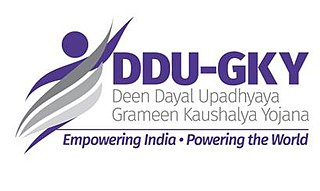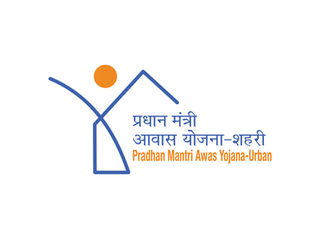Power Grid Corporation of India Limited is an Indian central public sector undertaking under the ownership of the Ministry of Power, Government of India. It is engaged mainly in transmission of bulk power across different states of India. It is headquartered in Gurugram. Power Grid transmits about 50% of the total power generated in India on its transmission network.
The Sampoorna Grameen Rozgar Yojana was a scheme launched by the Government of India to gain the objective of providing gainful employment for the rural poor. From 21 February 2003, EAS became an allocation-based scheme. The programme was implemented through the Panchayati Raj institutions.
Konch is a community development block of Gaya district in Bihar, India. Konch(Konch Village/Konch Panchayat/Konch Thana-Police Station) is a typical village market area slowly taking shape of a sub-urban settlement and centre of small business. Konch has very important temple known as Koncheswar Mahadev belonging to the later Gupta period which now has been taken under the protection of Archaeological Survey of India (ASI).

Bhupesh Baghel, popularly known as Kaka, is an Indian politician who served as the 3rd Chief Minister of Chhattisgarh from 2018 to 2023. He was president of Chhattisgarh Pradesh Congress from 2014 to 2019. He represents the Patan constituency in the Chhattisgarh Legislative Assembly since 2013 and from 2003 to 2008. He had been cabinet minister of Transportation in undivided Madhya Pradesh in Digvijaya Singh government from 1999 to 2003. He was first Minister for Revenue, Public Health Engineering and Relief Work of Chhattisgarh.
Rakasiya is an old village in the Gaya district in the Indian state of Bihar. Located northwest of Manpur, it is approximately 3 km from the town of Tekari, towards Nimsar Dam. Rakasiya is on the bank of the Morhar river, and has a population of around 1500.
Guhar Moti is situated near Narayan Sarovar, in Kutch district in Gujarat. It is located near the Narayan Sarovar Village and the Koteshwar temple, at 23.6352°N 68.5424°E.
The 2009 Union budget of India was presented by the finance minister, Pranab Mukherjee, on 6 July 2009.

REC Limited, formerly Rural Electrification Corporation Limited, of which Power Finance Corporation Limited (PFC) is holding company, which in turn is under the ownership of the Ministry of Power, the Government of India. It finances and promotes power projects across India. The PSU provides loans to Central/State Sector Power Utilities in the country, State Electricity Boards, Rural Electric Cooperatives, NGOs and Private Power Developers. On 20 March 2019, PFC signed the agreement to acquire a 52.63% controlling stake in REC for ₹14,500 crore (US$1.8 billion). On 28 March, PFC announced that it had completed making the payment for the acquisition and intended to merge REC with itself in 2020. However, REC has maintained that merging PFC-REC is no longer an option.

Pradhan Mantri Gramin Aawas Yojana, previously Indira Awas Yojana, is a social welfare programme, created by the Indian Government, to provide housing for the rural poor in India. A similar scheme for urban poor was launched in 2015 as Housing for All by 2022. Indira Awas Yojana was launched in 1985 by Rajiv Gandhi, the Prime Minister of India, as one of the major flagship programs of the Ministry of Rural Development to construct houses for the Below Poverty Line population in the villages.
Molasi is a village situated 16 km south of Tiruchengode in the Indian state of Tamil Nadu. It lies on the bank of the river Cauvery, which flows from Coorg hills.

The Tamil Nadu Generation and Distribution Corporation Limited (TANGEDCO) is an electrical power generation and distribution public sector undertaking owned by the Government of Tamil Nadu. It was formed on 1 November 2010 under section 131 of the Electricity Act of 2003, and is the successor to the erstwhile Tamil Nadu Electricity Board. The electricity board's generation and distribution wings are its nucleus. TANGEDCO is a subsidiary of TNEB Limited.
Ismailpur (Harauli) is a village in Vaishali district of Bihar state in India.

Grameen Kaushalya Yojana or DDU-GKY is a Government of India youth employment scheme.
Deen Dayal Upadhyaya Gram Jyoti Yojana is a Government of India scheme designed to provide continuous electricity supply to rural India. The government plans to invest ₹756 billion (US$9.5 billion) for rural electrification under this scheme. The scheme replaced the existing Rajiv Gandhi Grameen Vidyutikaran Yojana.

Pradhan Mantri Awas Yojana (PMAY) is a credit-linked subsidy scheme by the Government of India to facilitate access to affordable housing for the low and moderate-income residents of the country. It envisaged a target of building 2 crore (20 million) affordable houses by 31 March 2022. It has two components: Pradhan Mantri Awas Yojana(Urban) (PMAY-U) for the urban poor and Pradhan Mantri Awaas Yojana (Gramin) (PMAY-G and also PMAY-R) for the rural poor, the former administered by Ministry of Housing and Urban Affairs and the latter by Ministry of Rural Development. This scheme converges with other schemes to ensure houses have a toilet, Saubhagya Scheme for universal electricity connection, Ujjwala Yojana LPG connection, access to drinking water and Jan Dhan banking facilities, etc.

Pradhan Mantri Ujjwala Yojana was launched by Prime Minister of India Narendra Modi on 1 May 2016 to distribute 50 million LPG connections to women of Below Poverty Line (BPL) families. A budgetary allocation of ₹80 billion (US$1.0 billion) was made for the scheme. The scheme was replaced by the Ujjwala Yojana 2.0 in 2021.
Saubhagya Scheme or Pradhan Mantri Sahaj Bijli Har Ghar Yojana was an Indian government project to provide electricity to the households. The project was announced in September 2017 by Prime Minister Narendra Modi, who said that the aim was to complete the electrification process by December 2018. Certain households identified via the Socio-economic and Caste Census (SECC) of 2011 will be eligible for free electricity connections, while others will be charged Rs. 500. On 16 November 2017, the government launched a website saubhagya.gov.in to disseminate information about the scheme. The total outlay of the project is Rs. 16, 320 crore while the Gross Budgetary Support (GBS) is Rs. 12,320 crore. The beneficiary household will get One LED lights, one DC power plug. It also includes the Repair and Maintenance of Meter Only (R&M) for 5 years. The scheme was closed in March 2022 since the target of 100% electrification was met.

The Third Ashok Gehlot ministry is the state cabinet of the Indian state of Rajasthan in the 15th Rajasthan Legislative Assembly headed by Chief Minister Ashok Gehlot.








